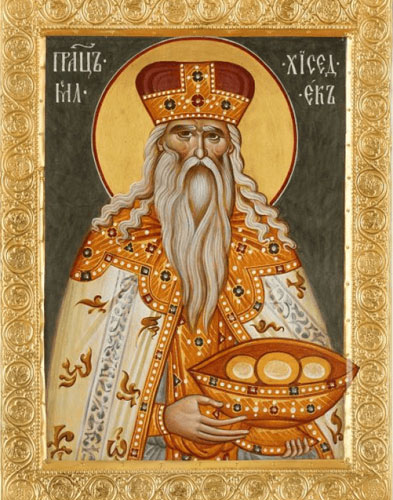The Most Holy Virgin Mary is the mother of the Eternal High Priest, Jesus Christ, of whom the prophets announced: Like Melchizedek you are a priest forever (Ps 110:4).
Why do these words of Sacred Scripture, Like Melchizedek you are a priest forever, (Ps 110:4) appear as a reference to Jesus Christ and, by prolongation, to us, the ministerial priests who participate in the one Priesthood of Christ?
Firstly, it is because the Priesthood of Jesus Christ is not in the order of Aaron, whose priesthood and bloody sacrifices were abolished when the New Law, the Law of the Gospel brought by our Lord Jesus Christ, took effect. On the contrary, the Priesthood of Jesus Christ is like the priesthood of Melchizedek, who was the king of Salem (that is, Jerusalem) and who offered an unbloody sacrifice, bread and wine, as is told in the book of Genesis (14:18). This sacrifice is a figure of the unbloody Eucharistic sacrifice, where Our Lord is immolated under the species of bread and wine.
Secondly, it is in order to make it understood that Melchizedek is a priest on account of a vocation from God, and not by Levitical family inheritance. As the author of the Letter to the Hebrews states, Melchizedek was without father, mother, or ancestry (Heb 7:3); this is why he is the model of all New Testament priests. Properly speaking, a New Testament priest now no longer belongs to any family, but only to God.
Thirdly, it is because Melchizedek’s is an eternal priesthood, a type and figure of the priesthood of Jesus Christ. The author of the Letter of the Hebrews continues by saying that Melchizedek is without beginning of days or end of life (Heb 7:3). What does this without beginning of days or end of life mean? It is a priesthood forever, an eternal priesthood, and, as such, it is the lineage and figure of the one Priesthood of Jesus Christ. It is worth noting that the Letter to the Hebrews speaks of eternal salvation (5:9), eternal redemption (9:12), eternal spirit (9:14), eternal inheritance (9:15), and an eternal covenant (9:15).
To Melchizedek, Abraham apportioned . . . a tenth of everything . . . a tenth of his spoils (Heb 7:2, 4). Here we can clearly see the superiority of the priest Melchizedek over the Patriarch Abraham himself, the father of all believers. This is why Melchizedek blessed Abraham, that is, Melchizedek blessed him who had received the promises. Unquestionably, a lesser person is blessed by a greater. In the one case, mortal men receive tithes; in the other, a man of whom it is testified that he lives on. One might even say that Levi himself, who receives tithes, was tithed through Abraham, for he was still in his father’s loins when Melchizedek met him (Heb 7:610).
In the fourth place, it means that we are dealing with a perfect priesthood, one to which nothing can be added, attached, or improved: If, then, perfection came through the levitical priesthood, on the basis of which the people received the law, what need would there still have been for another priest to arise according to the order of Melchizedek? (Heb 7:11).
Aaron was incapable of offering the perfect gift. Today the perfect gift is indeed offered, through the hands of those who, like us, are priests according to the order of Melchizedek. This gift is the Eucharistic Sacrifice, the memorial of the New Covenant sealed with Christ’s blood. This sacrifice is not on account of a precept of a law that has its origin in the flesh, but by the power of a life that cannot be destroyed (Heb 7:16); that is, it has the power that the immortality of our Lord Jesus Christ gives it, because Christ, raised from the dead, dies no more; death no longer has power over him (Rom 6:9). Accordingly, in Heb 7:24 we are taught that, in contrast to Aaron’s priesthood, Jesus Christ, because he remains forever, has a priesthood that does not pass away, and, as a consequence, You are a priest forever.
For all of these reasons, the dignity of the one priesthood of Jesus Christ does not bear any mark of imperfection or of expiration, but is eternal and, as such, a better priesthood. The Letter to the Hebrews mentions this many times, with phrases such as a better covenant (8:6), a better possession (10:34), a better homeland (11:16), a better resurrection (11:35), something better (11:40), and sprinkled blood that speaks more eloquently than that of Abel (12:24).
The ministerial priesthood participates, in its way, in the priesthood that is forever, this priesthood in aeternum.
We the ministerial priests receive two things through the sacrament of Orders: sanctifying grace and the grace proper to orders, that is, the priestly character. What is this character? The Apostle Saint Paul speaks of it in the Second Letter to the Corinthians, But the one who gives us security with you in Christ and who anointed us is God; he has also put his seal upon us and given the Spirit in our hearts as a first installment (1:2122). Just as in baptism or in confirmation, which imprint characters, the Holy Spirit puts his seal (1:22) on the one who receives the sacrament of Holy Orders. That seal is the sacramental character; what this sacrament does is mark and seal the soul, leaving an indelible seal in it that will always adhere to it and that can never be erased.
What is the function of a sacramental character, like the ones received in Baptism, Confirmation, and Holy Orders? The character does two things: first, it disposes us to receive, and, in this case, disposes us to be made into something sacred; it gives us a receptive disposition. Secondly, that character gives some sign by which we are distinguishable from everyone else. In the sacrament of Orders, received by every Catholic priest, the character gives us the ability and the power to perform and administer the sacraments and to preach the Word of God. In a special way, it gives us those tremendous powers over Christ’s physical Body: to transubstantiate the bread and wine into His Body and Blood, and the remarkable power to pardon sins in His Name and with His Power. The Apostle Saint Paul refers to this power in his first letter to Timothy: Do not neglect the gift you have, which was conferred on you through the prophetic word with the imposition of hands of the presbyterate (4:14).
Day in and day out, in the celebration of the Holy Mass, priests ask the Heavenly Father to “be pleased to look upon these offerings,” that is, the sacrificial offering: “Be pleased to look upon these offerings” as Eucharistic Prayer One reads. With eminent solemnity, the sacrifices of Abel, Abraham, and Melchizedek are mentioned, not only because they were figures of the immolation of Christ, but also because of the interior dispositions that accompanied their sacrifice, the interior dispositions of Abel, Abraham, and Melchizedek.







